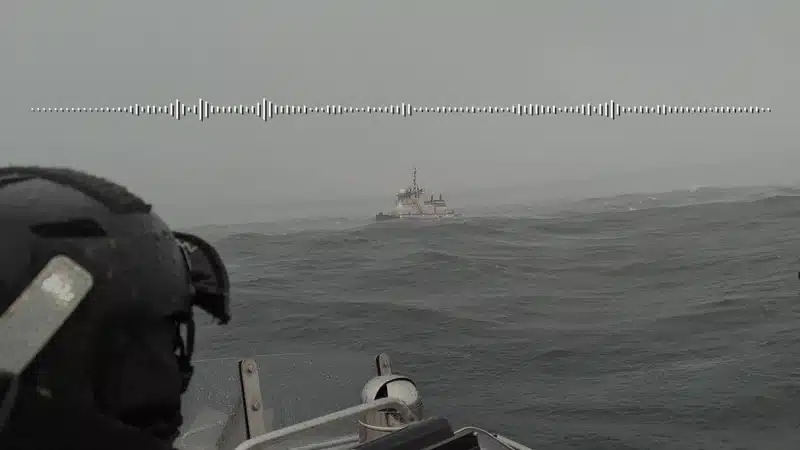Canadian Rescue Ship Saves Drifting Tug From Grounding off Washington
U.S. and Canadian Coast Guards Work Together to Save Tug Luther from Danger Near Washington Coast

On Friday, the U.S. and Canadian Coast Guards teamed up to rescue a tugboat named Luther and stop it from drifting ashore near La Push, Washington. Bad weather made the rescue tricky, but teamwork and quick action prevented disaster.
At around 4 PM on Friday, the 130-foot tug Luther lost control while pulling a concrete barge about 10 miles from La Push. The tug’s crew quickly asked the U.S. Coast Guard for help. Responding to the call, the Coast Guard sent a motor lifeboat from their Quillayute River station, a helicopter from Air Station Astoria, and the emergency response tug Lauren Foss. Weather conditions were harsh, with waves up to 14 feet high and winds blowing at 45 knots.
Since the Luther could not steer, its crew used the vessel’s twin engines to keep the bow pointed into the waves. However, things got worse as the tug started taking on water. To stay safe, the crew disconnected the barge they were towing and stabilized their tug while waiting for help.
Soon after, the Lauren Foss arrived to tow the disabled Luther. But the drifting barge came dangerously close to the tug, raising fears of a collision. To avoid danger, the Luther’s crew moved to the Coast Guard’s motor lifeboat. During the transfer, one person fell into the water, but the lifeboat crew acted fast and pulled them out safely.
With the Luther still floating toward the shore, the Coast Guard put one of their members back on the tug to try towing it again. The Lauren Foss managed to connect a tow line, but the operation hit a snag when the line got tangled in the Lauren Foss’s propeller. This forced the tug to return to port, leaving the rescue unfinished.
As backup, the Canadian Coast Guard sent their emergency tug Atlantic Raven from Vancouver Island. The Raven reached the scene early Saturday morning, joining other Coast Guard teams from Neah Bay and Port Angeles. Together, they set up a tow line and managed to keep the Luther from hitting the shore, just one mile away.
The Atlantic Raven successfully towed the Luther to Port Angeles, ensuring all crew members made it back safely without injuries.
Meanwhile, the concrete barge the Luther had been towing was missing. The Coast Guard worked with the barge owner, the state ecology department, and the local Makah Tribe to find it. The barge carried 10,000 tons of cement mix and 1,200 gallons of diesel fuel, raising concerns about potential environmental risks if it leaked.
Despite tough weather conditions, search teams looked for the barge on Saturday. High winds, rough seas, and low visibility made the search difficult. But by Saturday evening, the Coast Guard found the barge and began efforts to tow it to a safe harbor.
The Atlantic Raven plays an important role in emergency operations along Canada’s west coast. Along with its sister ship, the Atlantic Eagle, it was hired by the Canadian Coast Guard in 2018 to help manage maritime emergencies off Vancouver Island. Both tugs are designed for rough weather and have powerful engines, making them twice as strong as regular harbor tugs.
The Luther, a 49-year-old twin-engine tug with 3,000 horsepower, is operated by a Seattle-based company. In July 2023, inspectors from the Coast Guard discovered problems with its steering system and ordered repairs. After the fixes, the Luther had trouble steering during drills, and a crack in its hull caused a small fuel leak. However, the vessel passed all safety checks after these issues were fixed.
Thanks to the efforts of the U.S. and Canadian Coast Guards, the Luther avoided grounding and made it to safety. Though the barge caused concern, responders acted swiftly to locate it and bring it under control. This rescue highlights the importance of quick action and international cooperation in handling maritime emergencies.
